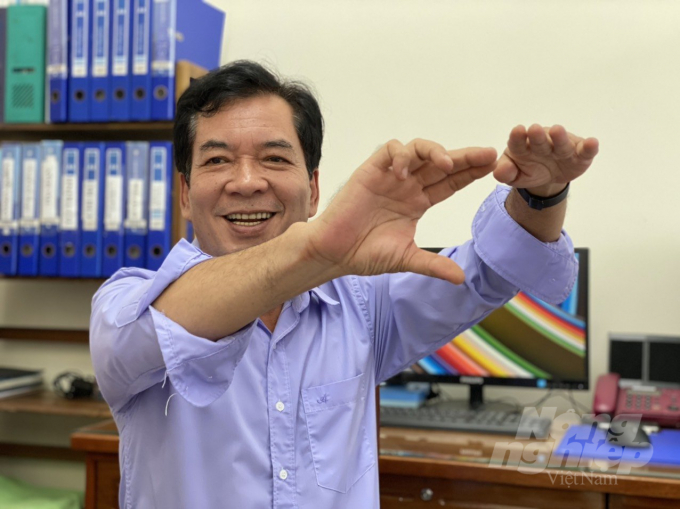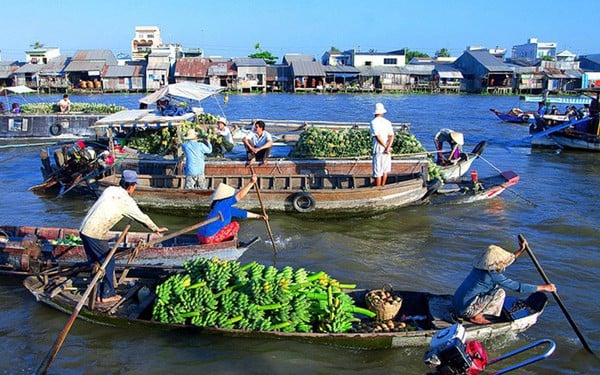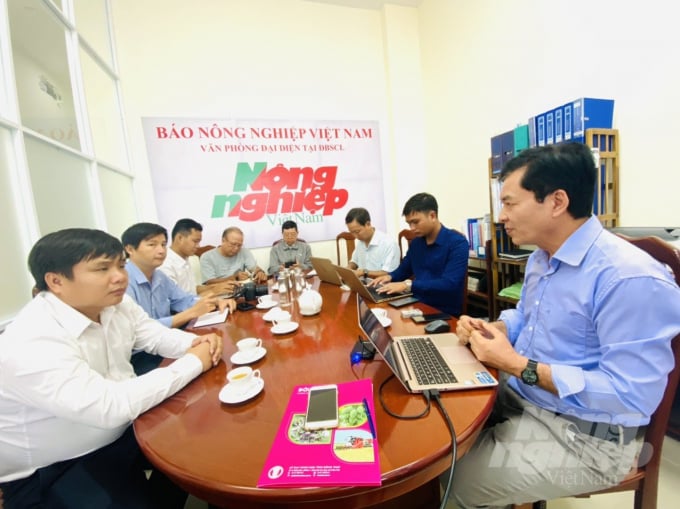May 21, 2025 | 04:11 GMT +7
May 21, 2025 | 04:11 GMT +7
Hotline: 0913.378.918
May 21, 2025 | 04:11 GMT +7
Hotline: 0913.378.918
The experts’ statement was heard at a round-table discussion about “Communication Stories and the Government’s Resolution 120/NQ-CP”, host by the Mekong Delta Representative Office of Vietnam Agriculture Newspaper in Can Tho City on May 10.
MSc Nguyen Huu Thien, an independent expert on Mekong Delta ecological system, also said there was so far no resolution to create a high social consensus like the Government's Resolution 120 / NQ-CP which focuses on sustainable development in the Mekong Delta.
“This is considered as a favorable resolution, paving the way for the Mekong Delta to develop sustainably in the future,” Thien added.
Resolution 120 paves the way for sustainable development of the Mekong Delta, basing on natural advantages, low impact, and less aggressive intervention in the environment.
The Mekong Delta has been and will be facing very concerning issues, especially those of climate change, sea-level rise, and landslides. Climate change causes extreme weather phenomena, increasing droughts, floods, and saltwater intrusion. Along with that is the human impact, particularly the construction of hydroelectricity on the main rivers makes the situation worse in years that face severe weather.

MSc Nguyen Huu Thien, an independent expert on Mekong Delta ecology shared his views about the Government’s Resolution 120 on sustainable development of the Mekong Delta region. Photo: Hoang Vu.
Mr, Thien said: “For a long time we have set development plans for the Mekong Delta just only focusing on land but not the sea. We are moving and encroaching towards the sea so that to expand the cultivation areas as much as possible with a goal to maximize rice production area.”
According to Mr. Thien, as the plans were much concentrating on developing rice cultivated areas, the Mekong Delta has lost flood absorption and storage spaces, miss the plans on building embankments to move floodwater to other places. This has made floods more serious. Quickly draining floods into the sea also cause increasing saline intrusion in the dry season.

Resolution 120 paves the way for sustainable development of the Mekong Delta, basing on natural advantages, low impact, and less aggressive intervention in the environment. Photo: Trung Chanh.

Participants at the round-table discussion about the Government's Resolution 120 on sustainable development of the Mekong Delta. Photo: Hoang Vu.
Taking advantage of natural conditions does not mean waiting for or depending much on them but must understand the nature to have an appropriate response.
“From this Resolution, we have a master plan for the Mekong Delta region,” Mr. Thien said.
Irrigation planning is a technical solution and a tool for production but not the lead of agricultural production that forces the society to follow.
"Planning on delta must make it a place to live, not a place of production. Turning the Mekong Delta into a giant farm means, in the long run, it will be exploited, exhausted and subjected to heavy pollution", Dr. Duong Van Ni, a lecturer at Can Tho University, raised his point of view like those of Resolution 120.

Dr. Duong Van Ni, a lecturer at Can Tho University, said that the consequences of preventing salinity and keeping fresh water at any cost have left many consequences. Photo: Hoang Vu.
Industrial planning in the Mekong Delta should not focus on heavy industries, but on agricultural product processing and supportive industries for agricultural development. Currently, supportive engineering mechanics for agricultural development is very in short supply.
Only rice cultivation currently is getting the highest mechanization while others plants are not getting adequate investments. Investment in high-tech agriculture is not only simply an automatic irrigation system or some net houses but also an entire ecosystem.
“Mekong River Delta is facing many difficulties but if we know how to overcome it skillfully, there will be a bright future. Resolution 120/NQ-CP of the Government focuses on solving the internal problems of the Delta among which, it prioritize development in the direction of following the natural conditions to restore the health of land and water sources. Like a living body, when in good health, it will improve the ability to better immune and protect against adverse conditions.”
Independent ecological expert, MSc Nguyen Huu Thien

Participants at the meeting on Government’s Resolution 120. Photo: Hoang Vu.
Mr. Thien said that according to Resolution 120, following nature means it is necessary to abandon the agricultural strategy based on "high input, high output" and switch to less intensive agriculture. Instead, we should create high value, build value chains in a way that less intensive intervention in nature so that to maintain the health for soil to get long-term food security.
“We should promote the self-adjustment of the delta, especially the ability to self-wash and clean the delta due to seawater through its tidal mechanism and freshwater flows through the flooding sheme,” the expert suggested.
In the upstream of the Long Xuyen and Dong Thap Muoi Quadrangles, it is necessary to change the function of the existing dyke system and remove the third rice crop to increase the flood-absorbing space and develop other local livelihoods during the flood season to replace autumn and winter rice crops.
Sand exploitation should be put under a coordination control mechanism to effectively prevent erosion and landslides. Investments should only focus on implementing works with large investment capital of the absolutely needed areas where the prevention of landslides is really urgent.
To limit the impacts that cause biodiversity loss, it is necessary to change the agricultural development strategy. The changes should not only be for the structure of crops and animals but they should be metabolic and comprehensive. Resolution 120 / NQ-CP of the Government does not solve the phenomenon but rather resolves the basis of the problem to help the Mekong Delta develop in the most sustainable way.
“When it comes to talk about transport development in the Mekong Delta, we only think of the big things, such as investing in highways, national highways, and provincial highways but forget about traffic from home to the fields. Sometimes, it is only about a few hundred meters of road, but it makes agricultural products stuck, stagnant and unable to transport quickly to the market.”
Dr. Duong Vy Ni, Lecturer at Can Tho University
Translated by Kim Khuyen

(VAN) Dong Thap farmers attained an average profit margin of 64% during the summer-autumn 2024 crop (first season), while An Giang and Kien Giang farmers followed with 56% and 54%, respectively.

(VAN) As a doctoral student doing research on renewable energy and electrification at Harvard University, the author shares his musings on electricity, nature, and countryside memories.

(VAN) The decree on Extended Producer Responsibility (EPR) ensures transparent management and disbursement of support funds, avoiding the creation of a “give-and-take” mechanism.

(VAN) Hue City rigorously enforces regulations regarding marine fishing and resource exploitation, with a particular emphasis on the monitoring of fishing vessels to prevent illegal, unreported, and unregulated (IUU) fishing.

(VAN) Hanoi People's Committee has issued a plan on reducing greenhouse gas emissions in the waste management sector with 2030 vision.

(VAN) Vietnam's draft amendment to Decree No. 156 proposes a mechanism for medicinal herb farming under forest canopies, linking economic development to population retention and the sustainable protection and development of forests.

(VAN) In reality, many craft village models combined with tourism in Son La have proven effective, bringing significant economic benefits to rural communities.